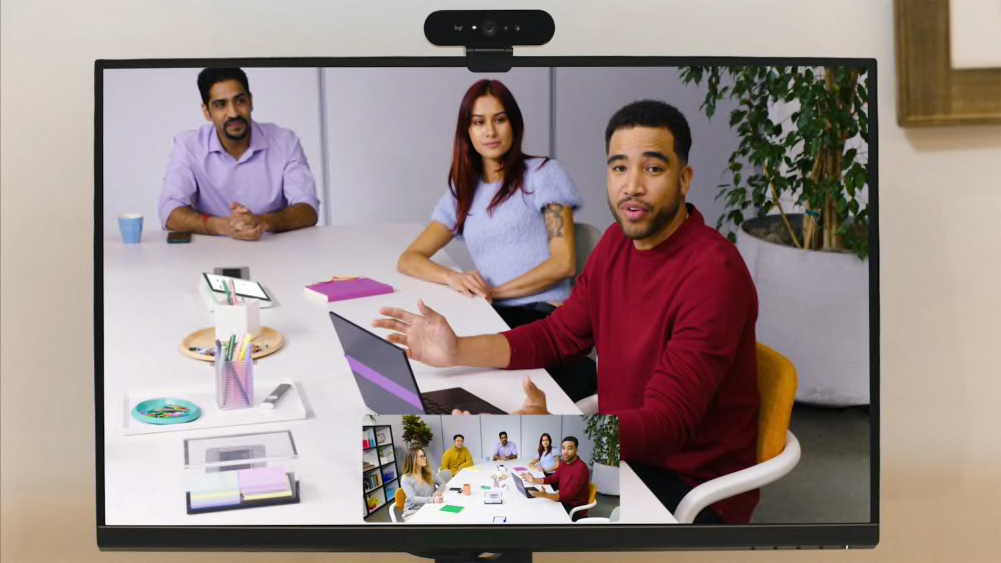Making Hybrid Meetings Work for Everyone
Introducing RightSight 2 and Speaker View

As hybrid work becomes the norm, remote meeting participants often feel like they do not have an equal seat at the table. Not feeling visible in a meeting results in a number of organizational communication and engagement issues. Inequitable meeting experiences are becoming a growing concern as organizations continue to hire in a distributed way. If left unaddressed, the disparity they create can lead to a divided work culture.
The Problem with Inequitable Hybrid Meetings
In a typical hybrid meeting, remote participants miss out on non-verbal cues that they would normally get in-person, along with overall context (for example, the ability to keep track of who is speaking). When the camera frames only the active speaker, remote participants can miss reactions like body language, facial gestures, and other cues that are vital to communication.
This affects in-person participants, too. In-person participants in hybrid meetings often struggle to see and hear remote participants fully due to poor visual and audio quality. As a result, they can often feel disconnected from those who join remotely, and will often instinctually focus on those who are physically in the room rather than those who are on-screen.
Remote participants taking a backseat in meetings due to technical limitations can lead to “proximity bias.”1 Proximity bias occurs when in-office workers gain arbitrary advantages over remote workers due to their location. It is the result of an “out of sight, out of mind” effect that takes place when remote participants are difficult to see and hear. This leads down a predictable path: unequal participation, disengagement, meeting outcomes left on the table, and dissatisfied employees.
The exclusion of remote participants from hybrid meetings is not a sustainable approach to the new world of work. It can result in disempowered workers who struggle to influence conversations, access decision-making, and get things done, along with a divided work culture. There is an increasing sense of urgency to solve this problem and make the hybrid meeting experience equally accessible for all participants, with equal visibility and equal presence.
RightSight 2 is Here
In CollabOS 1.5, we introduced RightSight 2, our latest advancement in auto-framing for Rally Bar and Rally Bar Mini. RightSight 2 brings much-needed conversation with context to hybrid meetings, creating a more lifelike, equitable meeting experience and a more unified hybrid workforce.
New Feature: Speaker View
With RightSight 2, we’ve added a new video mode called Speaker View, where both the speaker and entire room are shown at the same time. With an immersive view of the whole conversation, remote participants can finally enjoy an equal seat at the table. Speaker View also makes it easier for in-person participants to connect properly with their remote counterparts by reducing any perceived distance.

RightSight 2 – Speaker View in action.
Engineering an Equal Experience
RightSight 2 is a big step forward on the journey to creating an equitable hybrid meeting experience. At Logitech, we are striving to make all aspects of hybrid work better for everyone at the same time, which is why we continue to create these innovations.
RightSight 2 will also be used to create unique, platform-specific experiences. For example, we’ve integrated Speaker View with the Zoom Rooms Smart Gallery platform, which supports multiple streams from a single meeting room. We take the stream of the active speaker and the stream of the room, and make these into two individual tiles for the remote participant's viewing experience.
Additional platform integrations will be released through future CollabOS updates.
RightSight 2 is compatible with major video conferencing platforms like Microsoft Teams on Android and Windows, Zoom Rooms, Google Meet, GoTo Room, RingCentral Rooms, Pexip Room, and Tencent Meeting Rooms.
Deploy RightSight 2 today and put your hybrid workforce on the same page in any space. Get RightSight 2 by updating CollabOS 1.5 through the Sync device management platform. Or, read more about the CollabOS 1.5 release.
YOU MAY ALSO BE INTERESTED IN
Browse Categories: